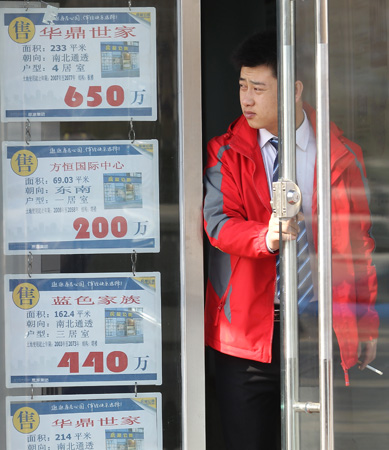BEIJING - China's housing market had a bleak week during the Lunar New Year holiday, with many cities seeing few transactions.
In Guangzhou, capital of South China's Guangdong province, 19 new properties were sold from Jan 22 to 27, a 59.6 percent year-on-year fall.
|

|
|
A real estate agent waits for clients in Beijing on Sunday. [Photo / China Daily]
|
In Hangzhou, capital of East China's Zhejiang province, only one property was sold during the holiday, local media reported.
In Nanjing, Jiangsu province, 35 home transactions were recorded during the week, a five-year low. In the city, 270 properties were sold during the holiday in 2007 and 39 in 2011.
Media reported that Beijing's market had its chilliest winter ever, without a single transaction during the holiday.
But a publicity officer with the Beijing municipal commission of housing and urban-rural development told China Daily that the suspension of the agency's official website during the holiday meant there were no transactions recorded. Housing buyers and sellers in the capital must complete their transactions through the website.
Many real estate agents in the capital said most of their staff members were off duty during the holiday because it's usually a slow season for housing deals.
"Our manager just asked one of my colleagues to stay in the office during the holiday because it's a low season. I only received one call from a client asking to see housing units when I was at home during the holiday," said Ma Jinguo, a broker with 5i5j Real Estate Service Co in Beijing.
Liu Yuan, a senior analyst with Centaline, a property agent, said the month in which the Spring Festival falls is always the slowest month of the year.
"Everyone goes home for the holidays and many developers suspend business during the holiday. Moreover, prospective buyers are taking a wait-and-see attitude since the market's prospects are unclear this year," he said.
Liu said although housing prices in some cities had eased, many people who have a genuine need to buy are still waiting for further declines, especially if the government takes further measures to curtail speculative buying.
An announcement from the State Council in January 2011 banned any family that already owned two housing units from buying a third one. Authorities also raised the down payment requirements for mortgages on second-home purchases.
At the same time, the government started to build 10 million housing units for low-income families in 2011 and promised to build more in the future.
Thanks to those measures, 52 out of 70 major cities saw month-on-month declines in new housing prices in December, according to the National Bureau of Statistics.
The Chinese Academy of Sciences' center for forecasting science has predicted that average housing prices would fall 5.3 percent this year.
Liu said that as speculators would be squeezed out by strict government policies, the market would shift to a focus on meeting demand from owner-occupiers and those trading up.
|


